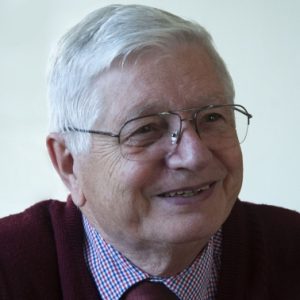Sándor Szalai
As an engineer, he worked on transmission technology for two years at the Telecommunications Research Institute (TKI), and then developed post-repair testing for the automatic systems of military aircraft (targeting device, robot pilot). Between 1971 and 1977, he developed computer-based automated measurement systems at the Joint Atomic Research Institute (EAI) in Dubna.
From 1977 he worked as a member of the Particle and Nuclear Physics Research Institute (RMKI, later Wigner Physics Research Centre, Wigner FK) of the Hungarian Academy of Sciences' Central Research Institute of Physics (KFKI). Between 1987 and 2012 he headed the Space Technology Department; he is a professor emeritus of the Wigner FK.
Before his space exploration tasks at KFKI, he designed nuclear electronic systems (environmental protection system of Paks power plant) and instruments. Between 1980-1985, he led the development of the image acquisition and tracking system of the VEGA probe launched to explore Halley's comet. In 1985, he was a visiting researcher at the European Space Research and Technology Centre (ESTEC) for three months, and then at the Max Planck Institut für Aeronomie for more than a year (1986-1987). Between 1991-1995, he designed the software for the ground control equipment of two experiments of NASA's Cassini probe exploring Saturn. Under his leadership, the fault-tolerant central computer of the Rosetta probe's landing unit (Philae Lander) was designed.
Between 1998 and 2019, he was the Managing Director of SGF Ltd. At SGF Ltd., he developed software for several instruments of the European Space Agency (ESA) interplanetary probes (Rosetta, Philae, MarsExpress, VenusExpress, BepiColombo and SolarOrbiter) and for the units providing testing of the Obstanovka instrument on the International Space Station (ISS). On behalf of the German Aerospace Center (DLR), he managed the development of the Lander Software Simulator (5 computers and 8 embedded processors) and participated in the creation of the operating program. Between 2013 and 2023, he worked on the development of equipment testing two instruments of the JUICE (JUpiter ICy Explorer) spacecraft.
He has published more than 150 scientific papers in journals and scientific conferences. He holds 6 patents. He is the co-author of the scientific film "In Search of Comets".
In 1992, he received his doctoral degree from the Hungarian Academy of Sciences after defending his thesis entitled "Automation of Scientific Experiments in Space Research".
He was a member of the Hungarian Academy of Sciences' Automation and Computing Committee (1997-2008), the Scientific Council of the VEGA spacecraft and the Steering Board of the Rosetta Philae lander. Member of the Hungarian Astronautical Society (MANT); honorary member since 2016. Member of the Scientific Council of the Wigner Foundation, the Hungarian Academy of Engineers, the International Academy of Astronautics (IAA), and advisor to the President of the Space Research Scientific Council.
Honors: EAI Institute Awards (1975, 1981); Honor of the USSR Atomic Energy Commission in 1977. In 1986, he received the State Prize, and in 1987, he received the Excellent Inventor Award. MANT awarded him the Ernő Nagy Medal in 2003 and the Albert Fonó Medal in 2014. He received certificates of recognition from NASA in 1994, 1998, and 2018, and from ESA in 2004, 2009, and 2017. In 2022, he received the Middle Cross of the Hungarian Order of Merit (civilian category).
- life story (2008)
- announcements (MTMT)
- Particle and Nuclear Physics Research Institute
- Television observations of comet Halley from VEGA spacecraft, Nature, volume 321, pages 262–266 (1986)
- Cassini probe with Hungarian participation - interview (2017, 24.hu)
- Space exploration success story - the Rosetta mission
- A new Mars probe launched with Hungarian software on board - the ExoMars probe
- A Hungarian instrument was brought to the space station: the Obstanovka
- "Rosetta 'WakeUp'" - In the footsteps of comets (video)
- He has two daughters and six grandchildren (2019 report).
- His knowledge of Russian and English was often useful in discussions with researchers from many nations.
Created: 2019.11.23. 21:37
Last modified: 2024.05.18. 11:26

